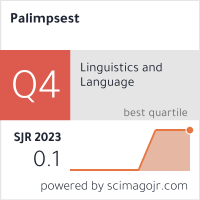THE INFLUENCES OF THE CRISIS IN THE „NOVELLE“ BY JOHANN WOLFGANG VON GOETHE
DOI:
https://doi.org/10.46763/PALIM23815193gjAbstract
This paper contains the analysis and observation of the text „Novelle“ by Johann Wolfgang von Goethe. According to the author, the most important is to be aware that novels are a literary genre that is required to influence the human soul. Besides, he himself defines the novel as an „unheard-of event “. In the organized and cultivated fictional world in „Novelle“, there is a fast spreading fire, that sways the old societal context and brings the safety of the world into question. Because the terrifying event challenges the humanity in mankind, we will look at its effect on the developmental processes of the characters in this novel. There will be a presentation of the ambivalent meaning of the term „crisis “, as it has a negative-destructive and a positive-rescuing function. This paper will explore the impact of the destructive force of the fire towards the characters, as well as the impact of the miraculous and unheard-of event. That way, we will hopefully get closer to answering the question: „What does it mean to be human? “, while also honoring Goethe’s biggest wish, to get to know mankind.
Keywords: crisis; Johann Wolfgang von Goethe; „Novelle“; fire; faith.
Downloads
Downloads
Published
Issue
Section
License
The intellectual property and copyright on the original content of all scientific contributions in the published paper shall remain with the authors. Authors give permission to the PALIMPSEST owner to publish the paper. All authors agree to publish the paper under Attribution-NonCommercial-NoDerivatives 4.0 International license (CC BY-NC-ND 4.0)


